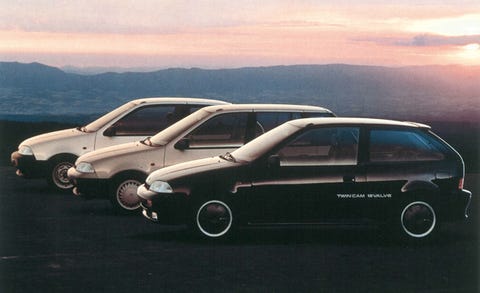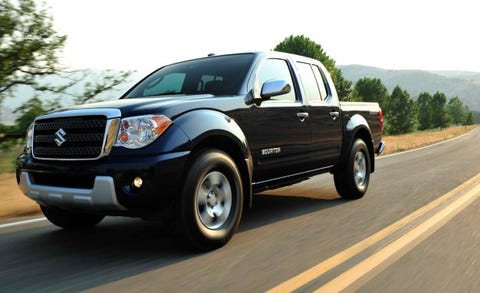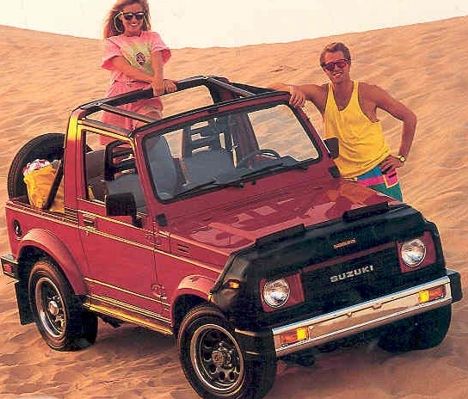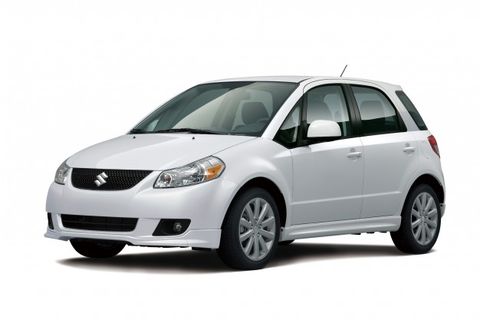Will Suzuki Sell Cars in Usa Again
We're in the midst of an automotive reckoning. Suzuki's annunciation this week that it will no longer be selling cars in the U.S. makes information technology the 10th major brand to disappear since the starting time of the century. Of those, one was a Ford make, one was a division of Chrysler, and the remaining viii all were either subsidiaries of or close partners with General Motors. (Many we recapped in our Decade in Review.) Similar Isuzu, another U.Due south. evacuee and estranged GM ally, Suzuki volition go along selling cars outside the U.S. Why did Suzuki, Nippon's 4th-largest car company, get out? And why does this keep happening?
A multi-dimensional look at Suzuki's U.Due south. sales
The Short Reply
The "tl;dr" caption—that's "also long; didn't read" in internet-ese—is that fifty-fifty though Suzuki has ii models that really are quite adept, Suzuki isn't selling plenty cars and tin can't compete with the big guys. The Kizashi and the SX4 may be virtuous, just the buyers aren't coming. Suzuki'due south U.Southward. sales peaked in 2007, with about 102,000 units sold, and roughshod to just a quarter of that last year. It becomes a expiry screw: Dealerships close, fewer cars are sold, the company has less money, debt piles up, and public image evaporates. Suzuki has no product in the pipeline for the U.S. and fewer corporate partners to lean on for rebadges.
In other countries, the situation isn't and so grim. Suzuki sells micro-size kei cars by the boatload in Japan, its Wagon R often the top-selling small car in the country. India, too, is a stronghold for Suzuki, where its Maruti Suzuki make unloads cheap, cheerful transportation to an exploding middle class.
Loss of Product Partners
Suzuki'southward core competency is in pocket-sized cars and minor SUVs. Really small. So to offer a total production lineup in the U.S., Suzuki has had to snuggle up to several corporate partners. The late Forenza and Reno were developed past GM Daewoo in Korea, back when Suzuki owned 15 percent of GM Daewoo and Full general Motors endemic 20 percentage of Suzuki. The Equator pickup was a Nissan Frontier with the Superman logo slapped on the front, while the XL7 crossover was built on the General Motors Theta platform used for the Chevy Equinox.
But Suzuki couldn't properly align with new friends to supply the production it needs—and fifty-fifty if it could, the result threatens profit margins. Ties are mostly severed with Full general Motors. A deal with Volkswagen fell through. Fiat, which sells a rebadged SX4 in Europe, has talked about closer ties with Suzuki merely no deals have been announced. Developing products and platforms on your own is expensive and difficult; Suzuki can swing that kind of investment for the minor cars it sells so well in other countries, but without much of a market for large ones like the Kizashi outside the U.Due south., it makes trivial sense.
Competition
The market for cheap, imported econo-cars—often even designed overseas—from niche companies has all-but disappeared, with Suzuki one of the last survivors among a field that included Geo, Isuzu, Yugo, Daewoo, Hawkeye, and Daihatsu. Mitsubishi continues to limp along. All were felled by competition from the big boys.
Decisions past Toyota and Honda to enter the small-scale-SUV market place in the mid-1990s was a headshot to Suzuki's business, long dependent on the Samurai, the Sidekick, and the Vitara. On the car side, the company was able to hold on a picayune longer. It wasn't until the mid-2000s when Kia and Hyundai introduced some truly competitive models hither. When they did, their cheap cars with long warranties slaughtered what remained of the inexpensive-import segment.
The EPA
The new Buffet and greenhouse gas rules unduly penalize low-volume manufacturers of physically small vehicles. Porsche can weather the storm (and afford penalties), but Suzuki was at risk. Even with a special exemption called TLAAS, or Temporary Atomic number 82-Time Allowance Alternative Standard, Suzuki would take needed to post almost impossible reductions to its cars' CO2 emissions—not because they're especially dirty, but because the EPA requires certain degrees of comeback. Suzuki and Porsche joined with Jaguar-Land Rover in voicing concerns to the EPA, but a final dominion issued in October showed them only minimal clemency.
Dealer Network
Suzuki's retail organisation was a proper mess. There weren't enough sales to back up more dealers opening, but too few dealers to actually abound sales. Low-profit-margin products and pocket-sized sales didn't ever concenter high-quality dealer managers and sales staff, which in plow probably turned off many customers. For years, dealers and Suzuki corporate alike complained about an antiquated, inefficient system for ordering vehicles in which the dealers had little input; they ofttimes didn't take access to the cars they could actually sell. It cost Suzuki dearly.
Are Nosotros Going to Lose More than Brands in the U.Due south.?
Very possibly. Mitsubishi is the obvious skater on sparse ice, and when asked this week, its U.South. dominate was firm in insisting the company will stay. (You lot didn't await him to be wishy-washy, did you?) Simply Mitsubishi is in very serious problem globally as well every bit in the States, because like Suzuki, information technology'due south experiencing how inhospitable the world car market is for smaller manufacturers.
In that location may come up a fourth dimension when Toyota pulls the plug on Scion, its own experiment with depression-priced entry-level econoboxes repurposed from other markets. In Scion'south favor, it'southward not hugely expensive to run, and Toyota has the cash to spare. Badging the new rear-drive sports car as the Scion FR-South instead of every bit a Toyota GT 86 in the U.S. is a something of a Hail Mary pass for the Scion brand.
It's virtually unthinkable, but Volvo may have to exit the U.S. market at some indicate as well. Volvo sales here in 2011 were just half of their 2003 level, and the visitor recently pruned several models from its lineup, including the S40 sedan, the C70 convertible, and the C30 hatchback. Whether Volvo remains largely will depend on the willingness of its owner, Geely, to put up with sluggish sales—and the importance of beingness in the U.S. to keep appearances as a global luxury brand.
Like all of these companies, Suzuki had some very good cars on offering in American showrooms. The Kizashi and the SX4 may not have been class-leading, but they weren't at the back of the group either—and both were well priced. If you're looking to score a bargain, now is a good fourth dimension for either. Suzuki will continue to honor warranties and supply parts, a hope made stronger by the company's plan to continue car sales in Canada, and to remain in the U.S. selling motorcycles and ATVs.
This content is created and maintained past a tertiary party, and imported onto this page to assist users provide their electronic mail addresses. You may be able to find more than information well-nigh this and similar content at piano.io
Source: https://www.caranddriver.com/news/a18743309/suzuki-ends-u-s-car-sales-why-it-had-to-do-it/





0 Response to "Will Suzuki Sell Cars in Usa Again"
إرسال تعليق